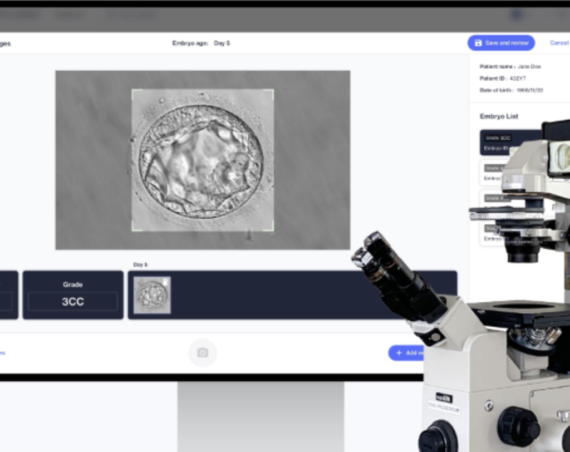
Michelle Zimmerman spent nearly five years building a cancer genetics business at Sema4, where she saw a glaring problem: About 90% of patients with hereditary cancer mutations only learned about their elevated risk after diagnosis – too late for prevention to make a difference.
The gap between what’s possible and what’s actually happening in cancer prevention drove her to co-found Previvor Edge with Sven Karlsson, an experienced healthcare operator. Today, the New York-based company announced it has raised $3.3 million in an oversubscribed pre-seed round led by CoFound Partners and Max Ventures, with participation from Humbition Capital, Red Swan Ventures, and Designer Fund.
“Like so many families, mine has been deeply affected by cancer,” said Zimmerman. “Recently, someone very close to me had cancer caught early, and that saved her life. But many people don’t get that chance, and that has to change.”
Previvor Edge is launching with a clinical program already in-network with Aetna, United, and Cigna. Early results show that over 90% of patients experienced a change in their prevention or detection strategy that otherwise would have been missed.
The Implementation Crisis
The numbers tell a stark story: 40% of Americans will be diagnosed with cancer in their lifetime, yet the healthcare system is failing at basic prevention. Less than 40% of patients with a family history of colorectal cancer get colonoscopies early. Only 15% of women who would benefit from chemoprevention – which can reduce breast cancer risk by 49% – actually receive it.
“If we just implemented the things that we already have in our guidelines, nothing new, we would avoid 20 to 40% of cancers and prevent 50% of deaths,” Zimmerman said. “The problem is really an education and implementation problem.”
Why Prevention Falls Through the Cracks
The issue isn’t complexity – it’s that cancer prevention is nobody’s job. Cardiovascular disease and diabetes patients for example see subspecialists who manage their elevated risk longitudinally. Cancer has no equivalent.
Primary care physicians are expected to assess family history, genetics, lifestyle factors, and vaccination status during standard appointments – and cancer prevention and early detection is a specialized investigation that requires dedicated focus and expertise. Genetic counselors primarily facilitate testing. Academic medical centers have small prevention programs, but they’re siloed and limited in scale.
Previvor Edge breaks down those barriers with a multidisciplinary team of physicians, oncology nurse practitioners, and genetic counselors working together across internal medicine, genetics, lifestyle medicine, and oncology.
How It Works
Patients begin with digital intake and a 45-minute onboarding visit where clinicians review medical history, family history, lifestyle factors and environmental exposures. About 80% proceed with genetic testing. Five weeks later, they return for a detailed care plan visit that outlines specific cancer risks, why they have them, and a 12-month action plan.
The care plan includes both clinical interventions – like earlier or more frequent screening – and lifestyle modifications. It also covers implications for family members. Previvor Edge orders tests and procedures that go beyond standard age-based guidelines, while primary care physicians continue handling routine screenings that every patient receives.
The program also integrates emerging technologies like blood-based screening tests and full-body MRIs based on preference and especially for patients with elevated risk where standard screening options are limited.
Building Clinical Credibility
Previvor Edge has assembled a Clinical Advisory Board of leading oncologists and researchers, including Dr. William Oh, Director of Precision Medicine at Yale Cancer Center, who serves as chair. The team runs weekly “board meetings” to review complex cases that fall outside standard guidelines.
“We have the tools today – genetic testing, advanced imaging, lifestyle interventions – that could dramatically change outcomes, but they aren’t reaching enough people,” said Dr. Oh. “Previvor Edge is the first scalable model to integrate these options into a single platform in a clinically responsible manner.”
The company has been seeing patients since April while building its clinical infrastructure and securing insurance contracts.
The Women’s Health Angle
While Previvor Edge serves all genders, women are expected to drive early adoption. “Women are usually the evangelists in the home,” Zimmerman noted. “We’ve had a lot of women ask their husbands to come through the program.”
Breast cancer screening is a key entry point, but the program goes beyond what specialized breast programs typically offer. It integrates medical history, family history, genetics, the Tyrer-Cuzick clinical risk score, lifestyle factors, and breast density – while simultaneously assessing risk and creating personalized management plans for other cancers.
For younger women considering fertility, the program addresses an often-overlooked connection: certain genetic mutations can reduce ovarian reserve, making the timing of genetic testing relevant for reproductive planning.
Confronting Fear
Perhaps the biggest challenge isn’t clinical or operational – it’s emotional. Cancer remains deeply frightening, and many people avoid learning about their risk.
One patient with significant family history had delayed genetic testing for years out of fear. She finally moved forward with Previvor Edge because having a clinical team ready to create an action plan made the information feel less overwhelming.
“She felt more comfortable knowing she was going to get the information – good or bad – and there was going to be a doctor right there to help her take action,” Zimmerman said.
The company positions itself as empowering rather than fear-inducing, focusing on control and early detection rather than worst-case scenarios.
What’s Next
Previvor Edge is now open to patients via waitlist and accepting provider referrals. The company is also in discussions with health systems about white-labeling its service line to extend cancer prevention and detection programs to their patient populations.
“We view ourselves as the specialized clinicians for managing cancer risk,” Zimmerman said. “Your risk changes as you age, as your health and your lifestyle changes, and as new family members get cancer. We also know the strategies we have to prevent and detect cancer continue to evolve. We expect to be the longitudinal home for managing your cancer risk over time so that you can get an edge against cancer.”



